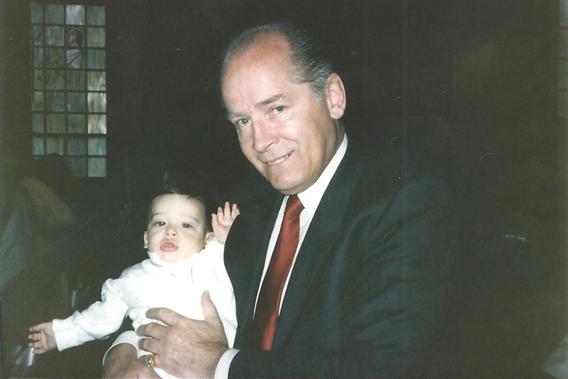Boston tough guy John Martorano gets back on the stand this morning. I think all 20 of Martorano’s confessed murders have been covered in detail by the end of direct questioning. It’s possible we glossed over a few. The prosecution wraps up by asking him, “Do you regret your life of crime?”
Martorano releases a hearty chuckle. “Of course,” he says with a smile. “Who wouldn’t?”
At this point, I think most impartial observers in the courthouse would like to see this evil person—who lives the life of a free man, remarkably—receive some sort of comeuppance. At 11:27 a.m., we get the best we can hope for: cross-examination.
I’m imagining defense attorney Hank Brennan pacing in circles around his living room last night, pressed suit on its hanger, practicing his opening question again and again. When Brennan strolls to the podium this morning, he’s raring to go. He eyes Martorano and begins his cross.
“Mr. Martorano, you are a mass murderer, are you not?”
That’ll wake up a courtroom.
“I don’t think so,” Martorano replies, with the slightest of squirms. It’s not clear which part of the statement he objects to.
He has confessed to shooting unarmed people in cold blood. So unless he’s devised an elaborate, Jesuitical argument it seems pretty fair to term him a “murderer.” Does he feel that a mere 20 murders do not justify the modifier “mass”? Do you earn that word only after you’ve killed, say, 35 or 40? Or perhaps Martorano interprets the phrase—if you’ll allow me to get vaguely Jesuitical myself—as a reference to murder in a Catholic church during the Eucharist?
As Brennan bears down, Martorano remains remarkably placid. He admits to killing innocent people who were misidentified. He admits to killing friends—looking them in the eye before shooting them in the head. There are two moments when the killer gets worked up:
1) During a hit on Herbert Smith, Martorano jumped into Smith’s car, saw three people there, and shot them all. It later turned out that one was Smith, but the other two were an innocent woman and 17-year-old boy. Martorano repeatedly insists that he couldn’t see who they were. “They were just silhouettes,” he explains, almost pleading with us to believe him. “It looked like they were wearing hoods. After I shot Smith, everything went blind in the car. If you try that sometime you’ll see.”
2) When a man named John Banno came at Martorano with a knife, outside an after-hours club, Martorano grabbed the knife away and stabbed Banno in the chest with it. Banno wouldn’t give in, so Martorano stabbed him again—20 times, according to later reports. Brennan now hectors Martorano on the stand, asking why he’d keep stabbing an unarmed, bleeding man. Martorano deflects, deflects, deflects … and then finally erupts, “ ’CUZ HE WOULDN’T SHUT UP!” He adjusts his glasses and tries to regain his composure. Brennan pauses for a few beats, letting the outburst echo around the silent courtroom.
Martorano remains strangely calm when he describes killing his close friend John Callahan. As Martorano describes him, “He was a high-priced accountant [during the] days, put on a leather jacket and wanted to hang out with the rogues at night.” In 1981, Callahan hatched a scheme to take over the World Jai Alai company. (Bad trend-forecasting there. Maybe should have invested in extreme sports instead.)
Callahan convinced Martorano to assassinate the WJA president, Roger Wheeler, a legitimate businessman in Tulsa, Okla., with the thought that Wheeler’s wife would then sell the company in her grief. So Martorano ran up to Wheeler in a country club parking lot, just after the man had finished a round of golf, and shot him right between the eyes. Soon after—fearful that Callahan would go soft and admit the crime to cops—Whitey Bulger convinced Martorano to kill Callahan, too. So Martorano picked up Callahan at the Fort Lauderdale airport, greeted him warmly, took his bag, ushered him into the front seat of a van, and then shot him in the back of the head. (By the way, the wife refused to sell.)
If I were on the jury, I’d be profoundly confused about the import of today’s testimony. We heard a whole lot about the crimes of John Martorano and only a little about the crimes of Whitey Bulger. Mostly, what we learned—or at least what I learned—is that Martorano is a straight-up, horrifying sociopath. And frankly, based on what we’ve heard in court thus far, it seems like Martorano should be at the defendant’s table and Whitey should be testifying against him.
Meanwhile, it is increasingly inconceivable to me that Martorano isn’t in prison or dead by the hand of a state executioner. Twenty murders, of the very coldest kind. Assassinating a man who had zero ties to organized crime, strictly for money. Wantonly shooting an innocent woman in the head. This guy lives among us? And has for the past half-decade? We should be genuinely frightened and appalled.
Martorano pays lip service to remorse, but his frequent smiles, chuckles, and defensive answers betray him: He’s not sorry. He thinks he deserves to be free. And I have no doubt he’d take up crime again if it suited him.
“Who told you it was OK to murder someone to protect your friends and family?” asked Brennan.
“Family comes first,” answered Martorano. “My father taught me that. The priests and the nuns that I grew up with told me that.” Later, he added: “I always try to be a nice guy.”
